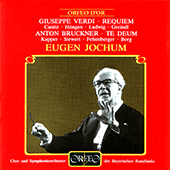Kim Borg
Born into a musical family, Kim Borg received his first singing lessons from his mother. He studied chemistry and voice, the latter with Heikki Teittinen at the Sibelius Academy in Helsinki from 1936. Following the outbreak of World War II Borg served as a military photographer in the Finnish army between 1941 and 1945, photography being one of his hobbies. Returning to music in 1945, he continued his vocal training while also (until 1947) studying theory and composition in Helsinki with Leo Funtek and Aare Merikanto; in 1946 he was awarded a diploma in biochemistry by the Helsinki University of Technology. Borg made his concert debut in Helsinki during 1947, subsequently pursuing further vocal studies with Magnus Andersen in Copenhagen and Andrejewa de Skilondz in Stockholm. His operatic stage debut took place in 1951 as Colline / La bohème at Aarhus in Denmark. He was quickly taken up by the Royal Danish Opera in Copenhagen: following his debut there in 1952 as Prince Gremin / Eugene Onegin, Borg was engaged on a regular basis; he also sang regularly throughout his career with the Helsinki Opera.
Borg’s international career took off rapidly: he was invited to sing Rangoni in EMI’s 1952 recording of Boris Godunov (made in Paris with Boris Christoff in the three principal bass parts and conducted by Issay Dobrowen), after which he recorded extensively for Deutsche Grammophon during the following decade. He undertook several concert tours to Germany, Austria, Holland, North America, Canada and Israel. He first sang at the Salzburg Festival in 1956, in concert, returning to sing in Haydn’s Die Schöpfung in 1965, and as Pimen in Herbert von Karajan’s production of Boris Godunov (1966, 1967). Borg’s first appearance at the Glyndebourne Festival came in 1956 with the title role of Don Giovanni. This was followed by Pizarro / Fidelio in 1959 and Prince Gremin in 1968. He made his debut at the Metropolitan Opera in 1959 as Count Almaviva / Le nozze di Figaro and sang there regularly until 1962, his roles including Golaud / Pelléas et Mélisande, King Mark / Tristan und Isolde, Amfortas / Parsifal, Don Giovanni, Don Pizarro, and Rangoni.
From 1960 Borg was a member of the Royal Swedish Opera in Stockholm, while during 1961 and 1962 he appeared as a guest with the Vienna State Opera, singing Don Giovanni and Count Almaviva. Much admired in Germany, he was a member of the Hamburg State Opera between 1965 and 1968, after which he continued this association as a contracted guest until 1974. He sang Osmin at the Drottningholm Festival in 1970 and during his career gave guest performances throughout Europe, in Belgrade, Bordeaux, Bucharest, Budapest, Leningrad, Nice, Oslo, Warsaw and Zürich. He also toured Australia.
Borg’s repertoire was extensive and included Baron Ochs / Der Rosenkavalier, Boris Godunov, Don Alfonso / Così fan tutte, Fafner, Hagen, Hunding / Der Ring des Nibelungen, Hans Sachs / Die Meistersinger von Nürnberg, King Philip / Don Carlo, Méphistophélès / Faust (Gounod), Osmin / Die Entführung aus dem Serail, Sarastro / Die Zauberflöte and Scarpia / Tosca. He also participated in the world premiere of Gunther Schuller’s opera The Visitation at Hamburg in1966. He retired from the operatic stage in 1980, but continued to teach, serving as a professor at the Royal Danish Conservatory in Copenhagen between 1972 and 1989.
A man of considerable presence as well as personal culture, Borg composed, prepared orchestrations of works by Mussorgsky and Wolf, and published several books. He possessed a richly resonant voice, which smoothly encompassed the baritone, bass-baritone and bass ranges; and was especially admired by the conductor Sir John Barbirolli, with whom he recorded Elgar’s The Dream of Gerontius.
© Naxos Rights International Ltd. — David Patmore (A–Z of Singers, Naxos 8.558097-100).

















